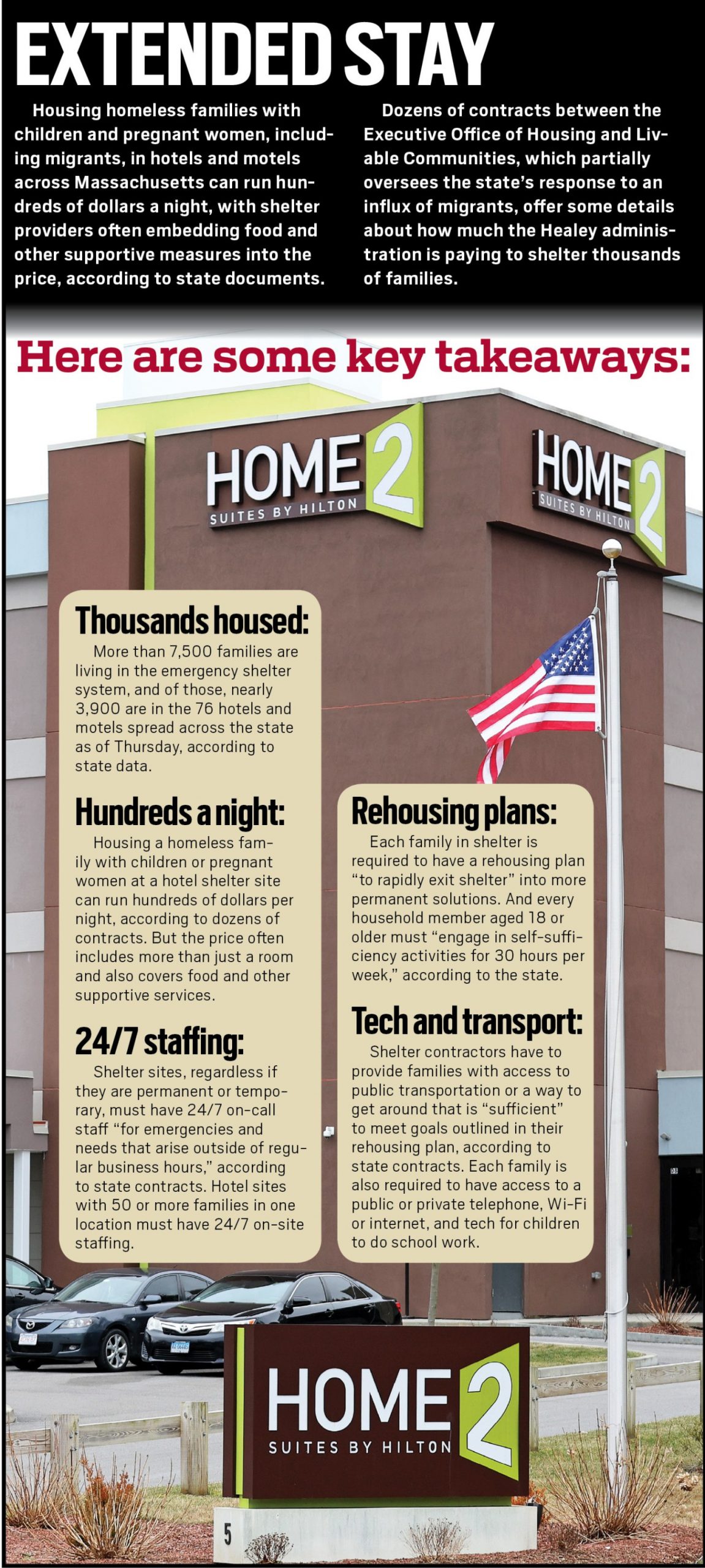
Housing families in state-funded shelters in Mass. can cost taxpayers $300 a night
Nightly rates to house homeless families in hotels and motels can run nearly $300, with agencies often baking in the cost of food and supportive services into the bill they hand to the state, according to contracts reviewed by the Herald.
Dozens of agreements released this week show contracts with social service organizations vary widely.
Housing homeless families with children and pregnant women, including newly-arrived migrants, at 76 hotels and motels across the state is not cheap, and both providers and state officials are hoping to turn away from the model eventually, said Leah Bradley, the executive director of the Central Massachusetts Housing Alliance.
But the demand on the emergency shelter system — a statutorily required program under the state’s decades-old right-to-shelter-law — has led Gov. Maura Healey’s administration to ramp up the number of available beds.
“Placing families in hotels, which is not ideal, is better than children dying on the street,” Bradley told the Herald.
Nearly 3,900 families were sheltered in hotels and motels as of Thursday, with just over 3,000 at sites where providers were offering services and 836 at locations supported by the National Guard, according to state data.
The Central Massachusetts Housing Alliance is serving one of the 55 hotels and motels staffed by a provider, according to a contract the organization has with the state’s housing department.
The Worcester-based group is charging $298 per night to house families in one of 30 temporary units at a hotel in the city, a contract last updated in October 2023 showed. Both food services and the cost of the hotel room are embedded into that price, Bradley said.
“Using hotels is not an ideal model and the housing cost is more expensive. A lot of times, the families don’t have cooking facilities, which limits their ability to provide meals for their family,” Bradley said.
The state’s housing department has several contracts in place with caterers to provide food at some shelter sites that do not have proper cooking facilities. Four companies were awarded deals after a no-bid contract with East Boston’s Spinelli’s Ravioli expired at the end of March.
Bradley said permanent shelters, like ones the Central Massachusetts Housing Alliance runs in the Worcester area and charges $157 a night to house people, are better for families because providers can make sure they have the amenities that are often not provided at hotels.
The Healey administration has projected that Massachusetts taxpayers will foot a $932 million bill this fiscal year to cover the costs of the emergency shelter system.
Spending is also expected to reach $915 million in fiscal year 2025, and if demand does not slow down, top Democrats on Beacon Hill have warned that budget cuts could come in fiscal year 2026.
A spokesperson for the Executive Office of Housing and Livable Communities said the high cost of housing and federal inaction on immigration reform “has led to the unsustainable expansion of the emergency assistance program.”
“The state has increasingly been forced to utilize hotels to provide temporary shelter for families and children. In response, we work to negotiate appropriate rates with hotel providers with the goal of transitioning families as quickly as possible into stable housing,” the spokesperson said in a Friday statement to the Herald.
Many of the contracts between the state’s housing department and shelter providers outline a range of services that are required to be provided to families, including access to a public or private telephone “to make necessary calls,” internet and Wi-Fi, and tech for school-aged children to ensure “completion of schoolwork and tutoring studies.”
Contractors are also required to provide access to public transportation so families can make doctors appointments or go shopping for necessities like food, toiletries, or diapers, according to documents reviewed by the Herald.
Organizations also agree to help families create, within five days of being placed in a shelter, “a comprehensive rehousing and stabilization plan established to rapidly exit shelter into safe, alternative, permanent housing,” according to several contracts.
“Each household will have a single rehousing and stabilization plan, however each household member aged 18 or older must engage in self-sufficiency activities for 30 hours per week unless excused for reasonable accommodation of a disability or good cause,” the contracts said.
In one contract signed on Sept. 27, 2023, by Fitchburg-based Making Opportunities Count, the state’s housing department agreed to a $151 nightly rate to house families in one of 43 temporary units at a Super 8 motel in Gardner.
The hotel, which is run by Wyndham Hotels and Resorts, is listed as “permanently closed” online and the website for the Gardner location did not list prior nightly room rates. A Super 8 in Sturbridge, about an hour away, ran about $140 a night depending on the type of room and time of year, according to the hotel’s website.
Making Opportunities Count also negotiated 30 units at a Rodeway Inn in Westminster at a temporary nightly rate of $295 per room, according to a contract with the state. Like the Super 8 in Gardner, the Rodeway Inn is listed as “permanently closed” online.
Two officials at Making Opportunities Count did not reply to emailed inquiries Friday at addresses listed on the organization’s contract with the Executive Office of Housing and Livable Communities.
